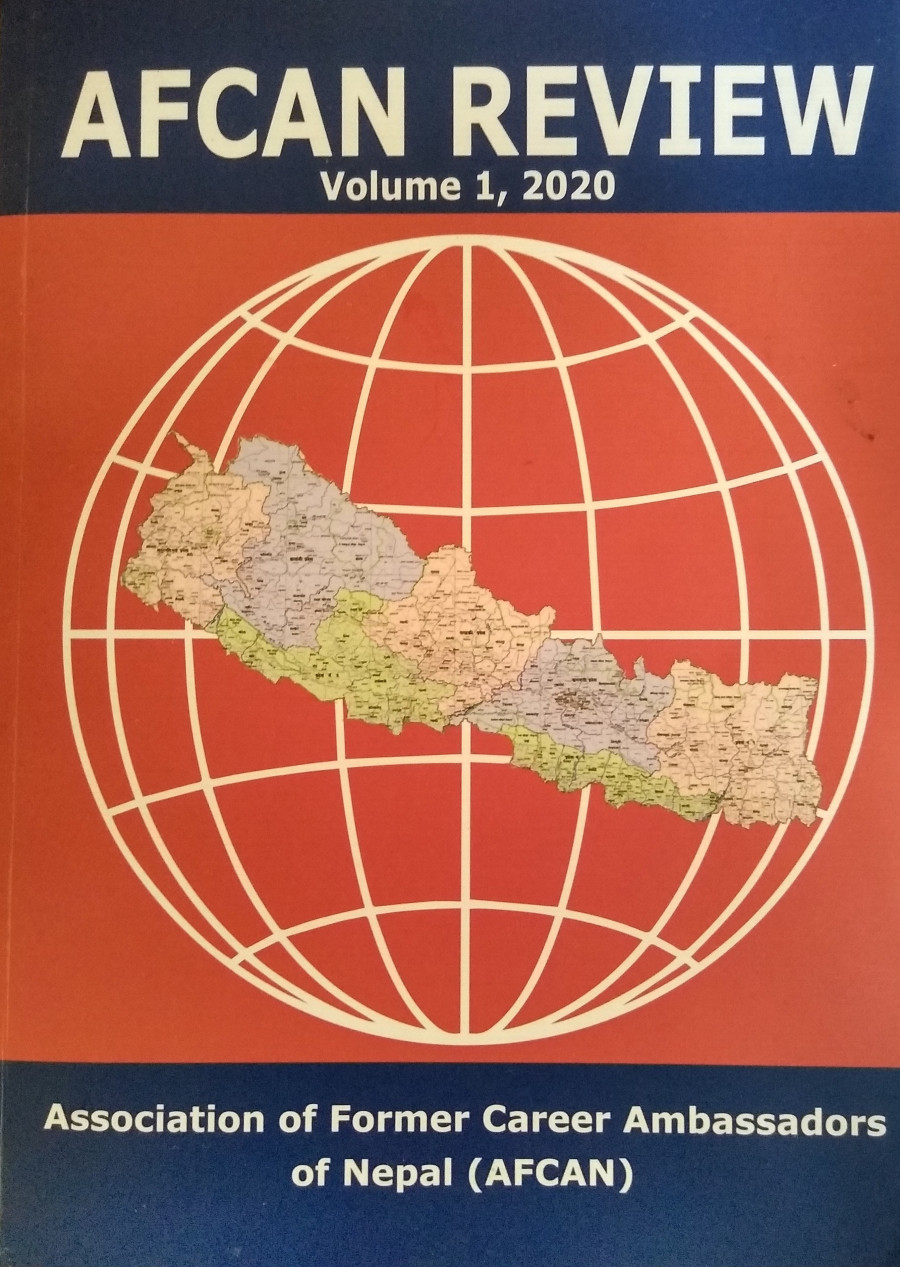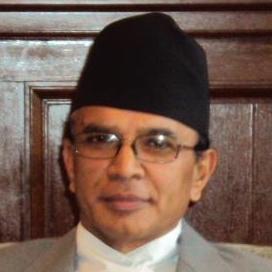Books
AFCAN publishes its first volume of AFCAN Review
Association of Former Career Ambassadors of Nepal’s first ever book is a laudable exercise.
Madan Kumar Bhattarai
Established in 2007, the Association of Former Career Ambassadors of Nepal, known more popularly by its acronym, AFCAN, has retired ambassadors belonging to the category of trained diplomatic professionals. Possibly to prove the maxim that it’s better late than never, the body has done a commendable job by publishing the first volume of the ‘AFCAN Review’. The book has a collection of fourteen pertinent articles along with the biodata of thirteen contributing professionals, a list of AFCAN members, detailed obituaries of five senior career diplomats who played instrumental roles in shaping and directing Nepal's diplomacy in various ways during their long innings in Nepal's foreign service.
Ambassador Sundarnath Bhattarai, seniormost among the contributors in terms of entry to the exclusive service, has penned two articles. In his first article, he has given a cursory account of the factors that led to the formal establishment of the AFCAN in 2007 after an initial attempt by some top foreign affairs stalwarts, both career and political appointees, to set up what can be called a composite unit, Ambassadors' Club, lost its steam.
The Ambassadors’ Club was established on December 8, 1999, and it was headed by Ambassador Jitendra Raj Sharma and Ambassador Surya Prasad Shrestha as president and vice-president, respectively. Bhattarai does not give an exact explanation for the nascent diplomatic organisation to become non-functional. The very reason that there was a division of responsibility between career professionals and political picks as represented by Sharma and Shrestha, respectively, speaks of the possible negative effect of attempted amalgamation of two crops of diplomats, a practice popular in recent Nepali parlance as bhaagbandaa (which indirectly means political give and take).
While AFCAN took its birth in 2007 with the membership of career professionals alone, the pent-up feelings apparently on the part of politically favoured ambassadors of being left out probably prompted them to have their own network by establishing the Association of Former Nepali Ambassadors (AFNA) on July 22, 2018, under the chairmanship of an academic Dr Shambhu Ram Simkhada, who served as Nepal's first residential Permanent Representative to the UN in Geneva.
Articles in the AFCAN Review cover a cross-section of issues ranging from a highly researched and solid topic on the age-old practice of diplomatic gifts by Ambassador Rudra Kumar Nepal to Ambassador Dr Dinesh Bhattarai's portrayal of more normative and constitutional aspects of the accepted domain of central government in terms of foreign policy vis-à-vis the Constitution of Nepal 2015 imbibing federalism, with a historical, geopolitical, comparative and theoretical perspective.
Likewise, two former Foreign Secretaries Kedar Bhakta Shrestha and Gyan Chandra Acharya have written good articles on different aspects of Nepal's foreign policy.
Another Foreign Secretary Madhu Raman Acharya has dealt in detail well-recognised but least practised saga of the primacy of New Delhi posting for a better understanding of Nepal's diplomacy along with a comprehensive account of his own contributions on Nepal-India relations during his short stint in the Indian capital. Ambassador Hari Kumar Shrestha, a senior hand on South Asia with an established knack for travelogues, has contributed a very nice article with a tell-tale title on the intricacy of Nepal-India relations.
Ambassadors Sundarnath Bhattarai and Dr Rambhakta Thakur, two senior diplomats with experience of serving in Beijing, have written on Nepal-China relations with focus on strategic partnership and Belt and Road Initiative, respectively.
Ambassador Madhuban Prasad Paudel, who commands a mastery of Nepali literature and is so far the only diplomat to head missions in two Gulf countries, and Ambassador Dr Niranjan Man Singh Basnyat have extensively dealt with status of labour and employment in the two Gulf countries and Malaysia, respectively. These two pieces shed light on various aspects of our labour diplomacy.
Ambassador Mohan Krishna Shrestha has adequately highlighted his achievements and the many initiatives he undertook to further promote Nepal-France relations. Ambassador Paras Ghimire has dwelt at length on both theoretical and practical underpinnings of Nepal-Myanmar ties. Last but not least, Ambassador Dr Khaga Nath Adhikari has thought it pertinent to fill the otherwise soaring gap in the book by contributing a solid article on protocol matters covering both similar and varying practices of presentations of Letters of Credence by accredited ambassadors in the ASEAN (Association of Southeast Asian Nations) world.
The section on obituaries contributed by former Foreign Secretary Ambassador Dr Madan Kumar Bhattarai relates to three successive Presidents of AFCAN (Ambassador Keshav Raj Jha, Prabal Shumshere Rana and Pushkar Man Singh Rajbhandary) and Ambassadors Dr Singha Bahadur Basnyat and Pradip Kumar Khatiwada. After the publication of the book, two more career stalwarts Ambassador Narendra (Rameshwar) Bikram Shah and Ambassador Indra Bahadur Singh have passed away in recent weeks. Shah was among our best foreign secretaries. I have personally assessed Shah as one of the navaratnas (nine jewels) of our foreign service.
Despite some proof mistakes that seem to have inadvertently crept in, it is a laudable exercise on the part of AFCAN to bring out the first work after 13 years of its formation. There is, therefore, a genuine expectation that the exercise is given continuity in view of our past experience as many such initiatives have lost direction in due course.
It may be pertinent to self-introspect on this aspect. In other countries, former career ambassadors are generally asked to take up major responsibilities in various state duties to take advantage of their expertise. Likewise, associations of former ambassadors are taken as major think-tanks in terms of imparting greater inputs and feedback to the Foreign Ministry. It is still a long way for AFCAN to assume such duties given our own peculiar circumstances that have guided our foreign policymaking both in theory and spirit.
I congratulate the AFCAN in general and members of the editorial board in particular for the excellent publication they have brought out for the benefit of both the diplomatic community and general readers who are interested in the realm of foreign policy and diplomacy. I wish the AFCAN all the success in its endeavours to become a major policy think-tank in the annals of foreign affairs.
————————————————————————
AFCAN REVIEW, Vol. 1, December 2020
Association of Former Career Ambassadors of Nepal (AFCAN)
Publishers: Association of Former Career Ambassadors of Nepal (AFCAN)
Pages 143




 22.11°C Kathmandu
22.11°C Kathmandu










